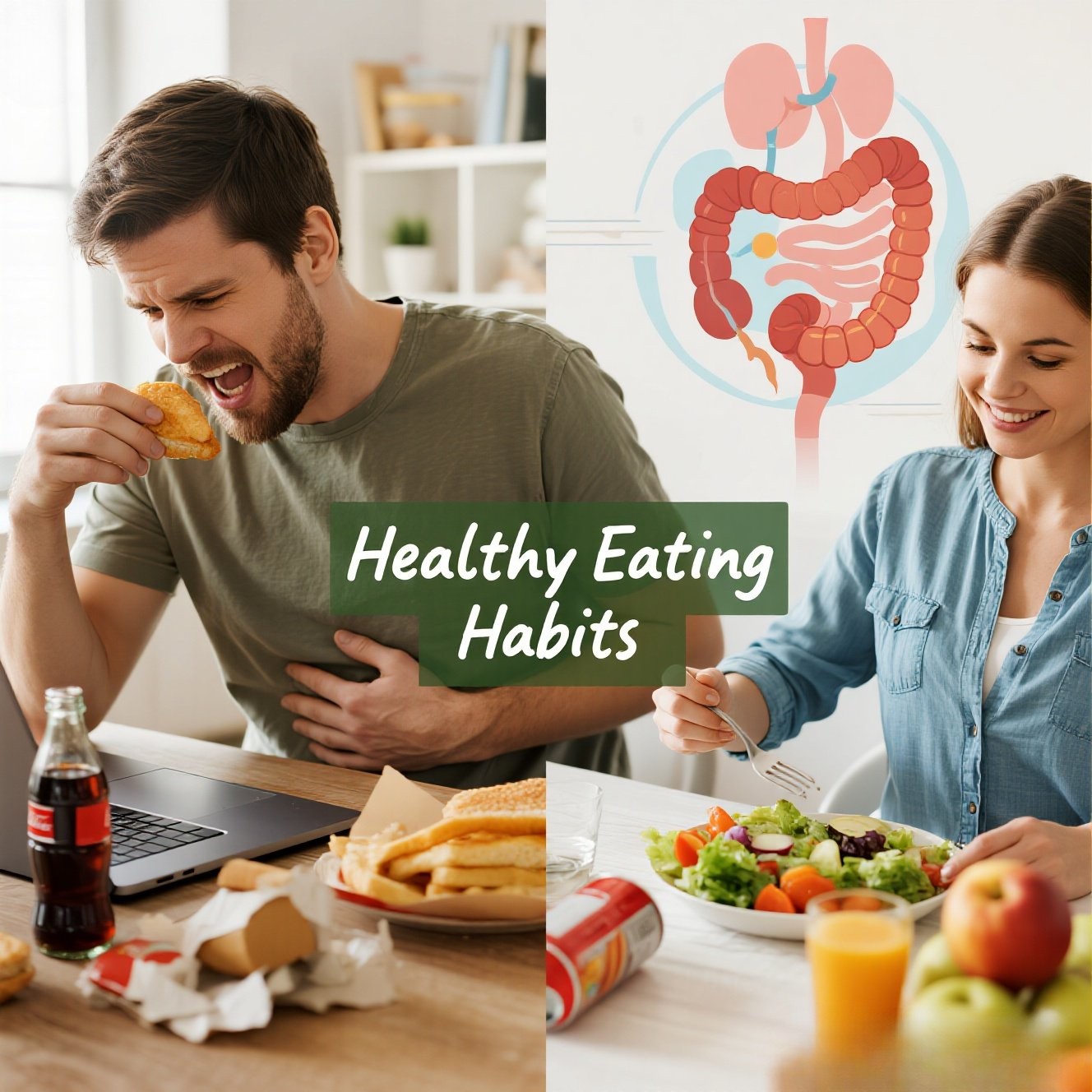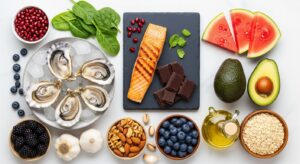How Modern Eating Habits Damage Your Stomach Health
Remember when dinner meant sitting down with family, savoring home-cooked food, and actually chewing your meal? Those days feel like ancient history now. Between grabbing breakfast on the go, wolfing down lunch at your desk, and ordering takeout for dinner while scrolling through your phone, our stomachs are staging a full-scale rebellion. And honestly, who can blame them?
The truth is, modern eating habits are wreaking havoc on our digestive systems in ways our grandparents never imagined. We’re not just talking about the occasional heartburn after a spicy meal – we’re looking at a widespread epidemic of digestive disorders that’s directly linked to how we eat in the 21st century.
The Rush-and-Crush Lifestyle: Your Stomach’s Worst Enemy
Let’s face it – we eat like we’re constantly running from a bear. Research published in Clinical Gastroenterology and Hepatology reveals that our modern habit of speed-eating isn’t doing us any favors. When we scarf down our meals in minutes rather than taking time to chew properly, we’re essentially asking our stomachs to do overtime without proper preparation.
Think about it this way: your stomach is like a hardworking employee who needs time to prepare for incoming tasks. When you eat slowly, your body releases digestive enzymes gradually, preparing for the food that’s coming. But when you inhale your lunch in five minutes flat? Your stomach gets overwhelmed, leading to that familiar afternoon bloat, discomfort, and yes, that embarrassing gas during your 2 PM meeting.
The bigger problem? Eating larger meals quickly expands your stomach and puts pressure on your lower esophageal sphincter – that’s the muscle that keeps stomach acid where it belongs. When this muscle gets overwhelmed, hello acid reflux and heartburn.
Ultra-Processed Foods: The Silent Gut Destroyers
Here’s a sobering statistic: ultra-processed foods (UPFs) make up well over 50% of most Americans’ diets. We’re talking about those convenient packaged snacks, frozen dinners, sugary cereals, and pretty much anything that comes with a barcode and a shelf life longer than your car lease.
Recent 2024 research has uncovered something alarming about these foods. UPFs are associated with a decrease in microbial diversity, lower levels of beneficial bacteria like Akkermansia muciniphila and Faecalibacterium prausnitzii, and an increase in pro-inflammatory microorganisms. In plain English? These foods are essentially carpet-bombing the good bacteria in your gut while rolling out the red carpet for the troublemakers.
But it gets worse. Modern ultra-processed foods contain large quantities of saturated and trans fat, added sugar, salt, and food additives that seriously affect the gut and physical health. These ingredients don’t just upset your stomach temporarily – they’re changing the entire ecosystem of your gut microbiome, which scientists now call your “second brain.”
The additives in these foods – emulsifiers, artificial sweeteners, preservatives – aren’t just innocent bystanders either. Food additives commonly added to UPFs have been shown in preclinical studies to affect the gut, including the microbiome, intestinal permeability and intestinal inflammation. They’re essentially poking holes in your gut lining, a condition charmingly known as “leaky gut,” which sounds exactly as pleasant as it is.
The Stress-Eating Double Whammy
Remember the last time you ate lunch while frantically finishing a report? Or scarfed down dinner while doom-scrolling through news headlines? You’re not alone, and your stomach is paying the price.
When you’re stressed, your body releases cortisol – the infamous stress hormone. High levels of stress hormones, like cortisol and adrenaline, decrease blood flow to the digestive system including the stomach, which in turn causes less hydrochloric acid production in the stomach. Without enough stomach acid, proteins and fats don’t get properly digested, leading to that heavy, uncomfortable feeling that makes you want to unbutton your pants after every meal.
But here’s where it gets really interesting: During the stress response, cortisol aids in moving blood flow towards the brain, large muscles, and limbs rather than towards the digestive tract. Your body literally thinks you’re in danger and decides digestion can wait. The result? Bloating, constipation, and a host of other digestive nightmares.
The gut-stress connection is a vicious cycle. Chronic stress can lead to an overproduction of stomach acid, which can contribute to acid reflux, heartburn, or even stomach ulcers. So you’re either producing too little acid to digest properly or too much acid that burns your esophagus. There’s no winning when stress is at the dinner table.
The Hidden Consequences: Beyond the Burn
The damage from modern eating habits extends far beyond occasional discomfort. These alterations in the microbial community contribute to persistent inflammation, which is associated with various chronic disorders including metabolic syndrome, irritable bowel syndrome, type 2 diabetes, and colorectal cancer.
Let that sink in for a moment. Your rushed lunch and processed dinner aren’t just giving you heartburn – they’re potentially setting the stage for serious chronic diseases down the road.
Chronic acid reflux can lead to complications like esophagitis (inflammation in the lining of your esophagus), Barrett’s esophagus (a precancerous condition), and even esophageal cancer. What starts as “just a little heartburn” can evolve into life-threatening conditions if left unchecked.
The Path to Digestive Redemption
Now for the good news – your stomach is remarkably resilient and responds quickly to positive changes. You don’t need to move to a monastery or grow your own vegetables (though if you want to, more power to you). Small, consistent changes can make a world of difference.
Slow Down and Chew Start with the basics. Eating smaller meals and chewing thoroughly gives your digestive system its best chance to break the food down. Put your phone away, turn off the TV, and actually taste your food. Your grandmother was right – mindful eating isn’t just good manners, it’s good medicine.
Time Your Meals Wisely Eating dinner earlier and finishing your last meal two to three hours before bedtime gives your body time to digest before lying down. This simple change can dramatically reduce nighttime acid reflux and improve your sleep quality.
Choose Real Food Start reading labels. If the ingredient list looks like a chemistry experiment, your gut probably won’t appreciate it. Focus on whole foods – vegetables, fruits, lean proteins, and whole grains. Leafy greens, such as spinach or kale, are excellent sources of fiber and contain a specific type of sugar that helps fuel growth of healthy gut bacteria.
Manage Your Stress Since stress directly impacts digestion, finding ways to manage it isn’t optional – it’s essential. Whether it’s a five-minute breathing exercise before meals, a lunchtime walk, or actually taking a proper lunch break, your stomach will thank you.
Support Your Microbiome Include fermented foods like yogurt, kefir, or sauerkraut in your diet. These foods contain beneficial bacteria that can help restore balance to your gut ecosystem. Low-fat yogurt has soothing qualities along with a healthy dose of probiotics that enhance digestion.
The Bottom Line: Your Stomach Deserves Better
Modern eating habits – the rushing, the processed foods, the stress-eating – aren’t just inconvenient digestive issues we have to live with. They’re serious health threats that affect everything from our energy levels to our long-term disease risk. The research is clear: how we eat is just as important as what we eat.
The beauty is, you don’t need a complete lifestyle overhaul tomorrow. Start with one change – maybe it’s taking 20 minutes for lunch instead of 5, or swapping your afternoon vending machine snack for an apple. Your stomach has been putting up with a lot, but it’s incredibly forgiving when you start treating it right.
Remember, every meal is an opportunity to either harm or heal your digestive system. In our fast-paced world, slowing down to eat properly isn’t lazy or indulgent – it’s one of the most important investments you can make in your health. Your stomach, and your future self, will thank you for it.
After all, you only get one digestive system. Maybe it’s time we started treating it like the sophisticated, hardworking system it is, rather than a garbage disposal that should handle whatever we throw at it, whenever we feel like it. Modern eating habits might be convenient, but when it comes to stomach health, the old ways – sitting down, slowing down, and savoring real food – still reign supreme.














Post Comment